The Most Intriguing Coaches of the College Football Season

Back by popular demand—or force of habit—it’s time for the annual preseason College Football’s Most Intriguing lists. First up, the most intriguing coaches:
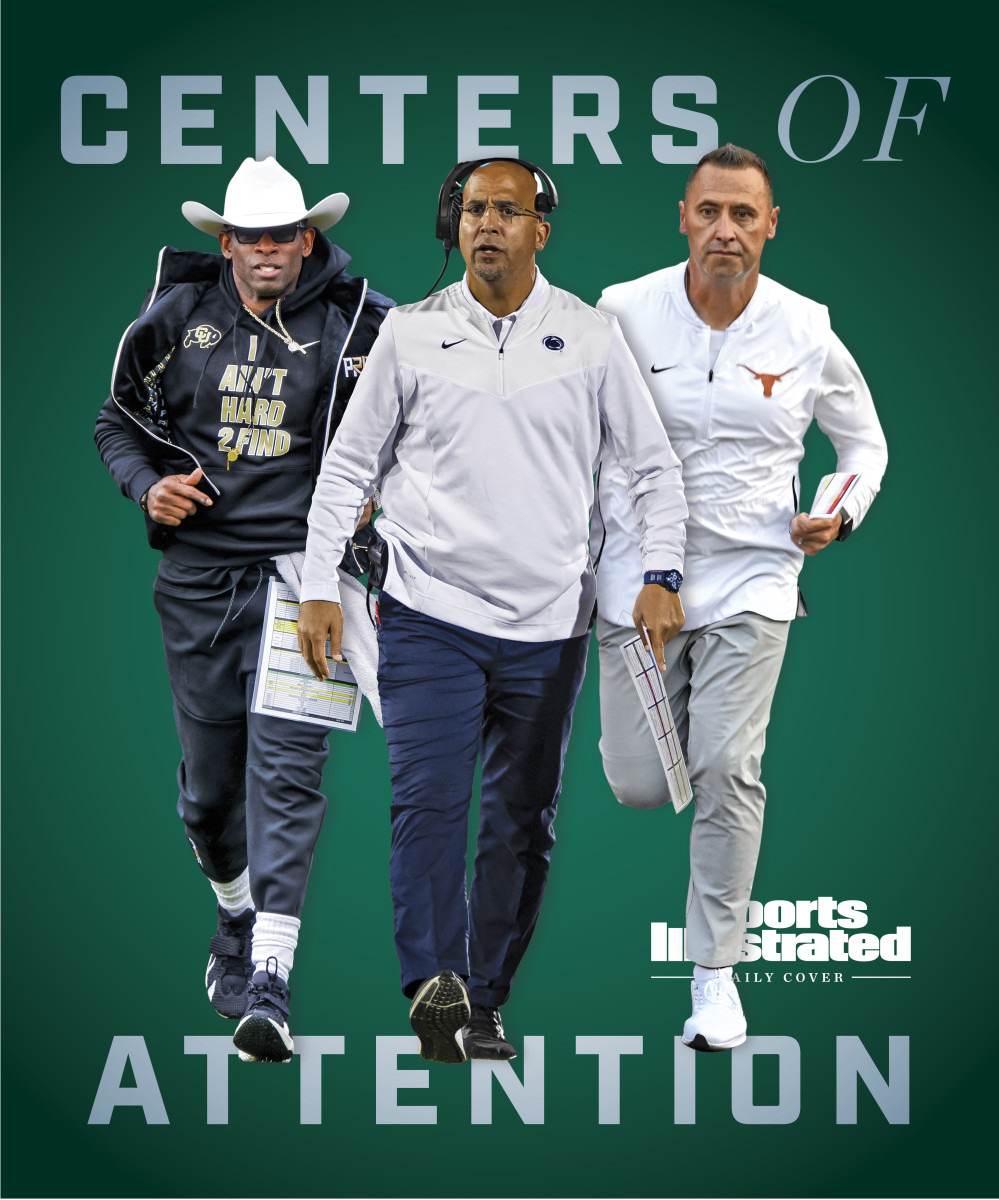
1. Deion Sanders, Colorado
This is one of the great chemistry experiments in the history of the sport. Sanders is an unconventional hire with a high-wattage personality and Hall of Fame player cachet, and his arrival has made the Buffaloes exponentially more interesting than they had been in decades. So interesting, in fact, that Deion helped drive the biggest realignment news of the summer so far: Coach Prime was a tangible factor in the Big 12 adding Colorado as a member in 2024. Sanders has worked the biggest roster overhaul in FBS history, with 46 incoming transfers and 41 outbound players since the start of spring practice. The networks are excited enough to give a team coming off a 1–11 season a pair of Big Noon Kickoff games on Fox and an ESPN prime-time window in the first three weeks. (Hopefully multiple summer surgical procedures won’t keep Sanders from his duties come September.) Coach Prime could yet prove to be all cowboy hat and no Power 5 coaching cattle, but he’s got everyone’s attention.
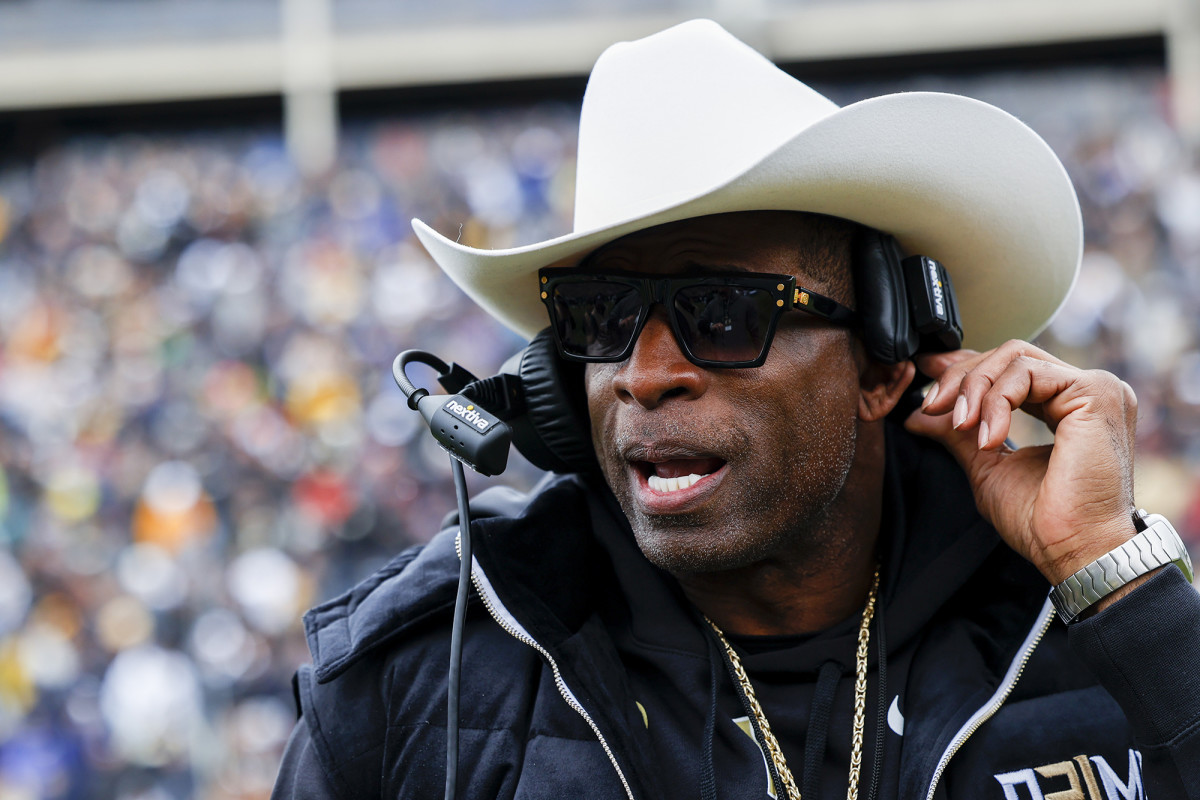
2. Jim Harbaugh, Michigan
There is some mud on the Michigan Man’s proud reputation now, with a likely four-game suspension coming down the pike from the NCAA for committing violations and then misleading investigators. Has a coach ever been suspended for one-third of a season and still won a national championship? Because that’s what Harbaugh’s trying to do. “I firmly believe we have the license and the ability to do it,” he told Sports Illustrated in May. Harbaugh’s decisive reversal of the Ohio State series has reinforced his status in Ann Arbor—he’s now a dual hero, player and coach. But business remains unfinished after consecutive disappointing performances in the College Football Playoff semifinals. The roster is loaded, and the schedule is soft enough to survive a four-game start with someone else coaching on Saturdays.
3. Kirby Smart, Georgia
Smart has established himself as the new king of the sport, winning two national titles by age 47 and knocking aside his mentor, Nick Saban. Now he’s taking a run at history, with no three-peat FBS national champions since the Associated Press poll first came into existence in 1936. A lot of people believe the Bulldogs can do it, despite 25 NFL draft picks over the previous two seasons, the loss of a 25-year-old quarterback and the departure of offensive coordinator Todd Monken. But this has been an uneasy offseason, with a high-speed car crash killing a player and staff member and pulling the lid off a dangerous, street-racing culture. Will the off-field controversies affect the on-field product this fall?
4. Steve Sarkisian, Texas
Sark’s 2023 checklist: deliver the best season of his good-not-great coaching career, send the Longhorns out of the Big 12 with a walk-off title, make the CFP, establish credibility and momentum going into the Southeastern Conference in ’24. Too much to ask? This is Texas, where asking a lot is standard operating procedure. Under-delivering on expectations has also been SOP over the past decade-plus, which is why this season is vital for Sark. A bad third season got Charlie Strong fired, and a third-year backslide set the stage for Tom Herman to be fired after his fourth season. If the Horns aren’t in the Big 12 title game, this situation gets twitchy.
5. James Franklin, Penn State
The Nittany Lions have mastered the middling art of the third-place finish in the Big Ten East, landing there four of the past six seasons. (The other two were second and fourth, so the average is an ironclad third.) Franklin’s teams have been reliably good, but not good enough to get over Ohio State and Michigan—he’s a combined 4–14 against those two in nine seasons. The rest of the league can relate to that record, but Penn State aspires for more, and now Franklin might have the squad that delivers on those aspirations. He’ll need sophomore quarterback Drew Allar to make the jump from backup to star.
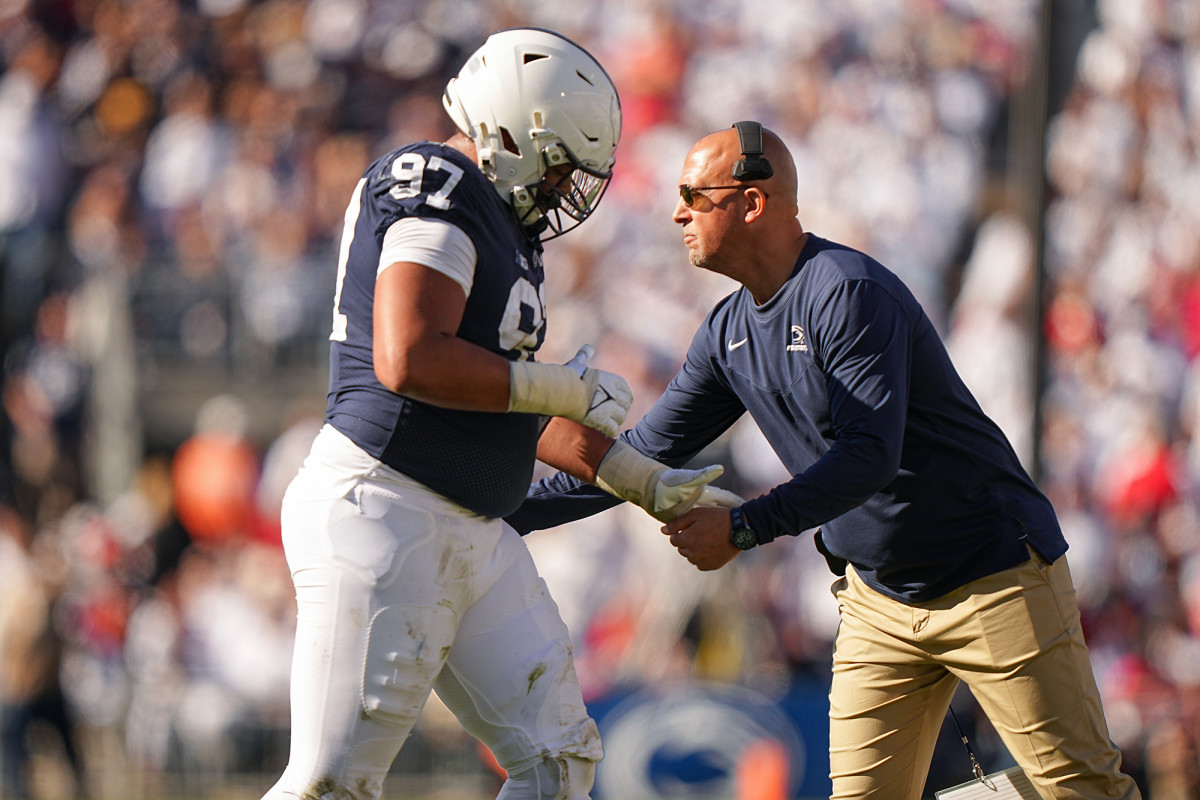
6. Mike Norvell, Florida State
Welcome to the griddle, and a level of expectation the 41-year-old Novell hasn’t previously faced in his career. Norvell’s tenure in Tallahassee took on a sudden shine in 2022, going 10–3 after consecutive losing seasons. That was the Seminoles’ best year since ’16, and this season the forecast calls for FSU’s best season since Jameis Winston was in uniform. That’s the last time FSU won the Atlantic Coast Conference and went to the CFP. Norvell has a pretty loaded roster this season, having supplemented returning talent with portal acquisitions, but the schedule presents many tests outside of Tallahassee: LSU in Orlando, at Clemson, at Wake Forest, at Pittsburgh, at Florida. Time to earn the new, $8 million salary.
7. David Braun, Northwestern
The school slipped floaties on the arms of its new coach and promptly threw him in the ocean, sending him out to sink or swim on his own as the face of the program last week at Big Ten media days. That was another case of mismanagement by Northwestern, which abruptly fired longtime coach Pat Fitzgerald amid a hazing scandal and elevated Braun, who had just arrived this year from FCS power North Dakota State. He'd never been a head coach before, much less spent time at a Power 5 program, and now he’s leading a reeling program into the season. One man’s thankless task is another man’s opportunity; we’ll see which this turns out to be for Braun.
8. Hugh Freeze, Auburn
Two things have empowered Freeze’s return to the SEC after a couple of towering scandals: an 83–42 record as an FBS coach, and not being easily discouraged. Freeze got his post-Mississippi rebound job at Liberty and went 34–16 across four seasons, then was the right man at the right time for Auburn: checkered past, has beaten Alabama. When SEC commissioner Greg Sankey introduced Freeze at media days, he made absolutely no mention of his star-crossed Ole Miss tenure—but rest assured, Freeze’s back-to-back upsets of Nick Saban while coaching the Rebels are significant reasons why he’s getting this chance.
9. Kalen DeBoer, Washington
Can small-school success translate to the top of the ladder? Consider DeBoer, who has retained the bones of his staff from his days at NAIA Sioux Falls, where he went a mere 67–3 from 2005 to ’09 and won three national titles. He also brought along several assistants from Fresno State (where he went 9–3 in ’21) and made an instant impact with the Huskies (11–2 last year). After nearly doubling Washington’s scoring year-over-year (21.5 to 39.7 points per game) and leading the nation in passing yardage, DeBoer retained star quarterback Michael Penix Jr. and a deluxe receiving corps. This will be one of the most entertaining offenses in the country; is there enough defensive balance to contend for a Playoff spot?
10. Nick Saban, Alabama
He’s in the top 10 of this list because he’s Nick Saban, but also because his vise-like grip on the sport has weakened. He’s trying to do what no other 71-year-old has done, which is win a national title. (Bobby Bowden did it at 70.) Meanwhile, Kirby Smart has asserted himself in the East, Brian Kelly is threatening to the West, and Saban is tasked with replacing two of the top three players taken in the 2023 draft. The primary concern is at quarterback, where Bryce Young carried things for two seasons, and the replacement options don’t seem to be up to recent Alabama standards. Saban also is replacing both coordinators, which could be a positive development but remains to be seen.
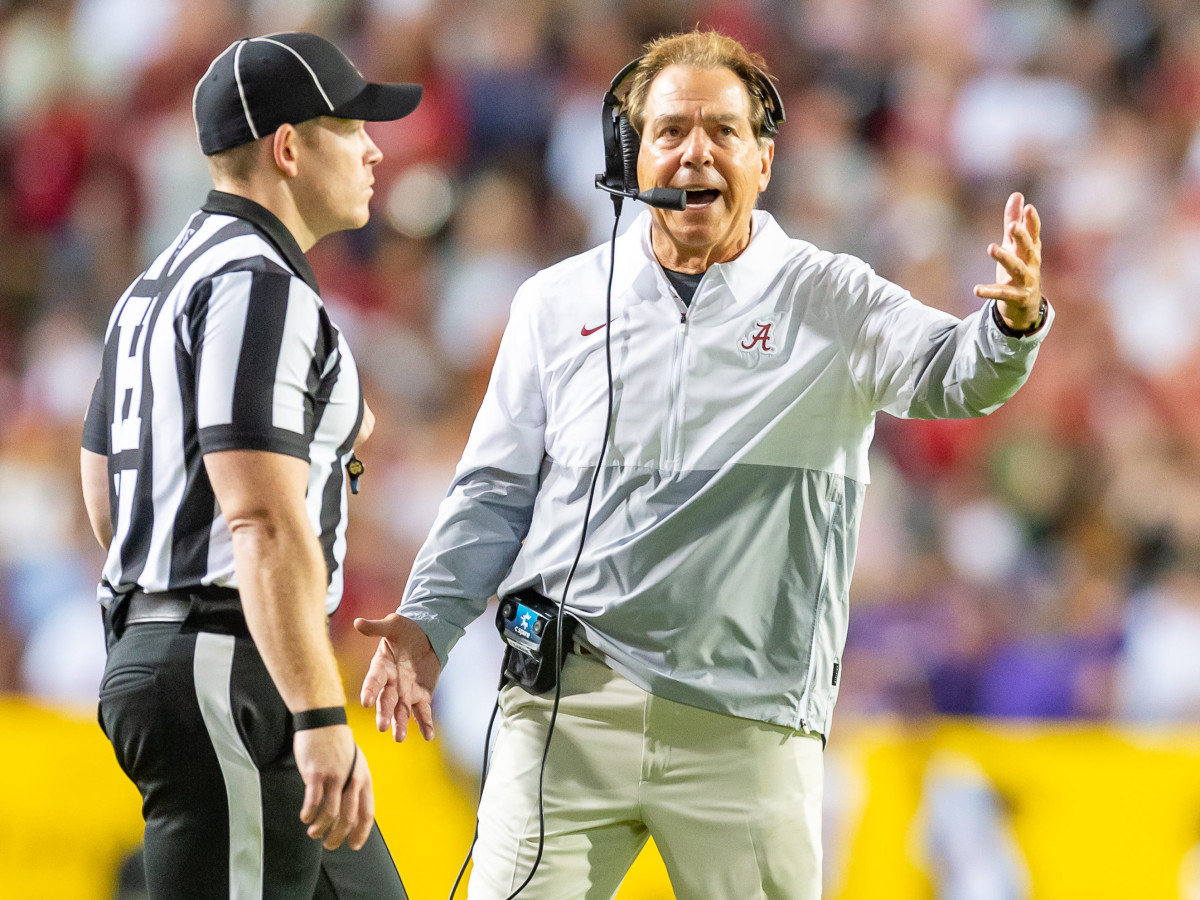
11. Lincoln Riley, USC
The makeover of the Trojans was swift and dramatic. Eleven victories, volcanic offense and a Heisman Trophy revived dormant Los Angeles buzz and has whetted appetites for more this year before Caleb Williams becomes the No. 1 draft pick next spring. Riley has once again done work in the portal to shore up weaknesses, most notably on defense. His Trojans still have to prove they’re physical enough defensively after being trucked by Utah twice and Tulane once, giving up averages of 545 yards and 45 points in those losses. That should put some pressure on coordinator Alex Grinch, who has been with Riley for the previous four seasons at Oklahoma and USC. The Trojans’ back half of the schedule is rugged, with Notre Dame, Utah, Washington, Oregon and UCLA in a six-week stretch.
12. Ryan Day, Ohio State
There are precious few places where a coach with a 45–6 record and two College Football Playoff berths could catch flak. Ohio State is one of them. A two-game, lopsided losing streak against Michigan is the extent of Day’s crimes against Buckeye Nation—the second of which had fans in Ohio Stadium heckling the coach. While Michigan has become a problem, this overlooks the fact Day absolutely could have won the national title last season if just one of three or four bang-bang plays had gone Ohio State’s way against Georgia in the CFP semifinals. The Buckeyes are in the unusual position of being slightly overlooked and undervalued; that could be a welcome change.
13. Matt Rhule, Nebraska
One of the better moves of the last hiring cycle was Trev Alberts bringing proven rebuilder Rhule to Lincoln. There should be immediate improvements in overall competence, game management and player development—but that doesn’t mean this will be easy. The Cornhuskers have had six straight losing seasons, with last year’s team particularly bad offensively (22.6 points per game was their lowest scoring average since 1969). Rhule’s past rebuilds at Temple and Baylor took until the third season to experience a major breakthrough; with the mobility created by the transfer portal and a 2024 schedule that is absent Michigan, Ohio State and USC, maybe he can accelerate that timetable by a year.
14. Dabo Swinney, Clemson
He’s racked up 12 straight seasons of double-digit victories, a feat previously accomplished by only Saban and Bowden. But the rock-solid terrain upon which Swinney once operated continues to shift underfoot. His coaching staff has changed; the quarterback once hyped as his next superstar has transferred; his ironclad grip on the rivalry with South Carolina has been loosened; and ACC competitor Florida State is back on the rise. What new offensive coordinator Garrett Riley can do with Cade Klubnik at QB could decide whether Clemson returns to national title contention. Dabo’s record in five years with Deshaun Watson and Trevor Lawrence as his primary starting QB: 67–7, with four CFP title game appearances. Without them: 94–34, with no title-game appearances.
15. Trent Dilfer, UAB
Not your average college coach career path: NFL quarterback, TV analyst, high school coach, leader of an FBS program. Dilfer was the most surprising hire of the year, but that doesn’t mean he’ll be a bad hire—at this point, nobody knows. Much like Sanders at Colorado, Dilfer isn’t tiptoeing into this gig. In June he threw down the gauntlet on a radio show to anyone who tampers with his players: “Come try to get my guys,” Dilfer said. “I dare you, Power 5s. I got a pretty big platform that I can step on, and if I find you in my kids’ DMs, and if I find you talking to high school coaches about my kids—if you’re in my roster, I’m gonna call your ass out.”
16. Luke Fickell, Wisconsin
Best hire of the cycle? Could be. The Badgers were in the right place at the right time to finally lure Fickell away from Cincinnati, where he was 53–10 over his past five seasons and took the Bearcats to the Playoff. Fickell set the standard for coaches blooming where they’re planted and building something solid before taking the step up, as opposed to grabbing the first available Power 5 pay raise. Fickell plus returning talent plus a few key transfers (led by quarterback Tanner Mordecai from SMU) plus a user-friendly schedule should immediately make Wisconsin the team to beat in the Big Ten West.
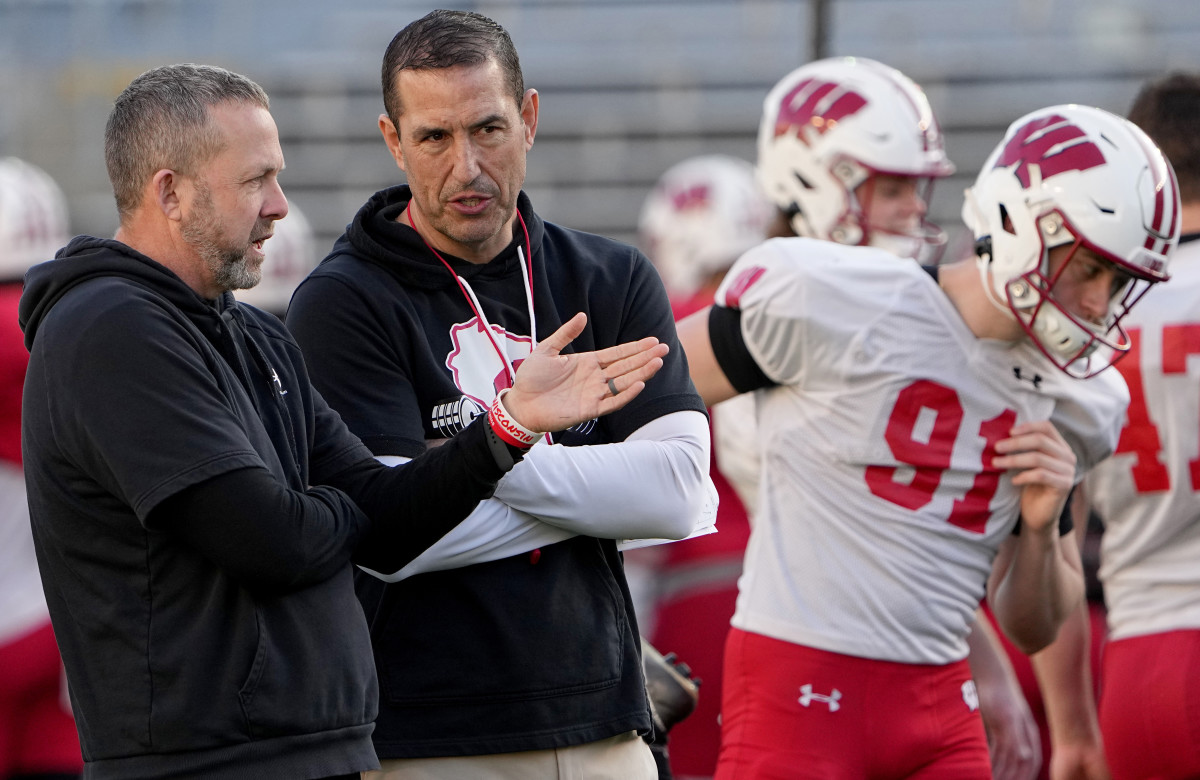
17. Willie Fritz, Tulane
Long considered one of the better Group of 5 coaches, Fritz dramatically increased his marketability by going 12–2 last year. It was merely the biggest turnaround in FBS history, going from 2–10 in 2021. The breakthrough season included upsetting eventual Big 12 champion Kansas State on the road, winning the American Athletic Conference championship and beating USC in the Cotton Bowl—one hell of a trifecta. Fritz has some rebuilding to do at the skill positions but has a great centerpiece in quarterback Michael Pratt (more than 8,000 yards total offense and 91 total touchdowns at Tulane). The defense lost its top five tacklers but still returns plenty of experience. Fritz is breaking in three new coordinators, which will be a dynamic to watch.
18. Sonny Dykes, TCU
He was the national Coach of the Year for a reason, taking a Horned Frogs program coming off 5–7 to the CFP national championship game in his first year on the job. Along the way Dykes was calm, grounded, approachable and enjoyed the ride—all characteristics that seem to escape many of his colleagues at the top of the food chain. Can that kind of lightning-in-a-bottle season be replicated by Coach Hypnotoad? Remains to be seen, but Dykes likes the pieces he has. That starts with quarterback Chandler Morris, who was the starter in the opener last year before getting injured and being replaced by a guy who went on to become a Heisman finalist, Max Duggan. Offensive skill slots have been filled by the transfer portal. Defense should be better.
19. Jimbo Fisher, Texas A&M
The first step in recovery is recognizing that a problem exists and asking for help. Fisher finally got there with his underachieving program, acknowledging that his offense wasn’t working with him as the play-caller. Enter Bobby Petrino, the most intriguing coordinator hire of the year, a game-plan/play-call savant but also a pain in the posterior of just about everyone he’s ever worked with or for. How does this high-ego duo coexist? How does Fisher coax a lot more out of his hyped 2023 freshman class? How many games does he need to win to convince rich donors not to collect the massive amount it would take to buy Fisher out?
20. Kenny Dillingham, Arizona State
The new Wonderboy on the block, fresh from coordinating at Oregon and now returning to his debilitated alma mater as the boss at age 33. Lauded for his offensive acumen, Dillingham’s best advertisement is his work with quarterback Bo Nix at both Auburn and Oregon. The offensive personnel is far less proven at ASU, with a lot of transfers in the mix and a decision to make at quarterback. Dillingham has impressed everyone with a readiness beyond his age, and he’s going to need that immediately. After opening with Southern Utah, the next three opponents are Oklahoma State, Fresno State and USC (a combined 28–13 last year).
21. Brian Kelly, LSU
Once he ditched the drawl, everything fell into place in a dreamy first season in Baton Rouge. The Tigers went 10–4, beat Alabama, won the SEC West, won their bowl game by 56 points and retained most of their top-line talent. Kelly left Notre Dame for the chance to recruit elite talent, and he’s stockpiling a lot of that quickly. “I know that based upon how we’ve recruited and how we’ll continue to recruit that we’ll have a football roster that will be able to compete against Georgia,” Kelly said at SEC media days. “Is that right now? No, it’s not. But if we continue to do what we’re doing, we’re going to have a roster that can compete against Georgia.”
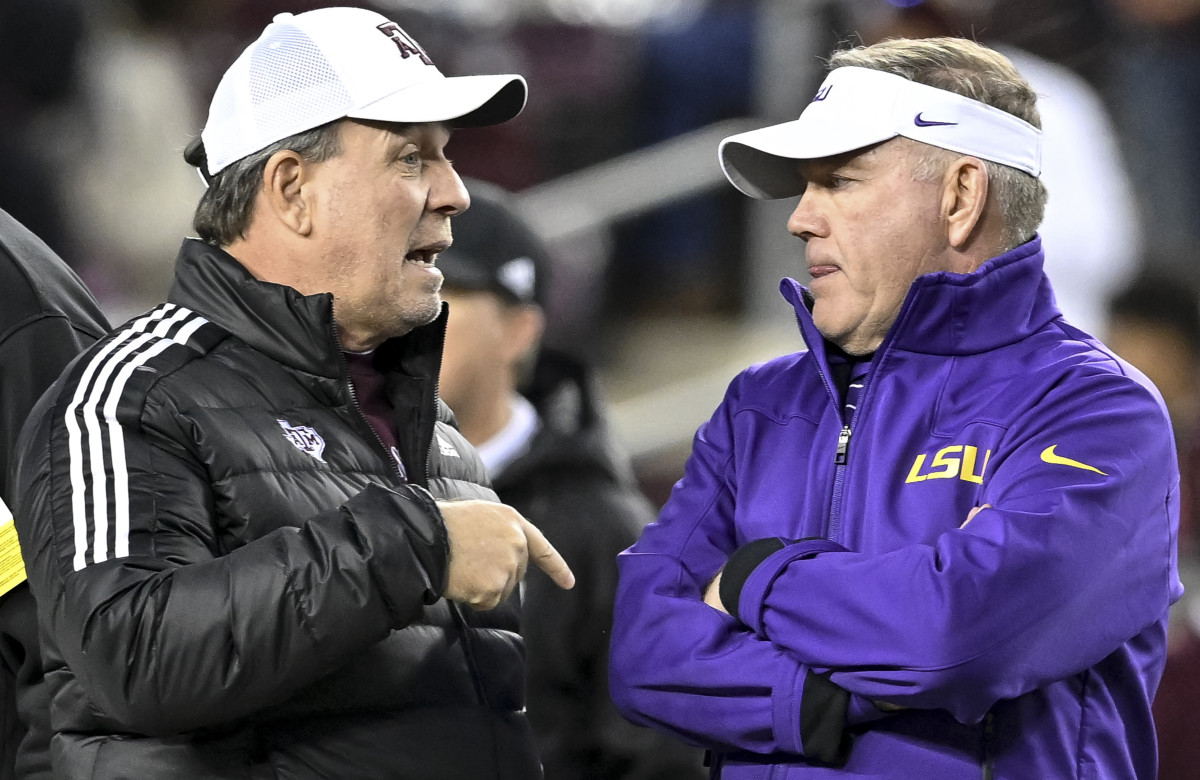
22. Mario Cristobal, Miami
As debut seasons in dream jobs go, the former Hurricane’s work at The U wasn’t ideal in 2022. Miami went 5–7, with five of the losses in the flatly embarrassing category: 14 points to Middle Tennessee, 24 points to Duke, 42 points to rival Florida State, 30 points to Clemson, 26 points to Pittsburgh. The clear hope is for major improvement with new coordinators and a more established culture. The schedule provides a chance for a fast start: Four of the first five are at home, and the lone road trip in that time is to Temple. If the Canes aren’t performing well heading into a more difficult final seven games, their famously fickle fans will start rethinking the massive investment in pulling Cristobal away from Oregon.
23. Mel Tucker, Michigan State
Speaking of coaches who got a huge payday and did not deliver, Tucker is trying to dig out from a 5–7 season that was followed by the startling transfers of starting quarterback Payton Thorne and star receiver Keon Coleman. There’s no minimizing the fine work Tucker did going 11–2 in 2021, but it remains his only winning season in four as a head coach. He needs to show that wasn’t a blip on the radar and can be replicated while competing in the toughest division in college football, playing five Big Ten road games and hosting potential top-10 opponent Washington.
24. Jon Sumrall, Troy
His first season as a head coach was a 12–2 revelation that could have been 13–1, if not for a Hail Mary touchdown loss to Appalachian State. Sumrall’s Trojans won a very competitive Sun Belt and beat UTSA in a bowl game, finishing eighth nationally in scoring defense (17.1 points per game) and tied for seventh in takeaways (26). Sumrall does have some rebuilding to do on both sides of the ball, but retains a 1,000-yard rusher and his starting QB. The 41-year-old former Kentucky linebacker is likely one more big season away from being a hot commodity in the job market.
25. Lane Kiffin, Mississippi
In the coming months, Lively Lane will provide several absurd/funny/weird reasons why you cannot have this list without him. For now, the primary point of intrigue is that he somehow has three starting-quality quarterbacks on his roster, two of which were transfers: holdover Jaxson Dart and newcomers Walker Howard from LSU and Spencer Sanders from Oklahoma State. Nobody has three qualified QBs anymore. This is the kind of sell job that wins a medical-sales rep a free vacation to Maui.
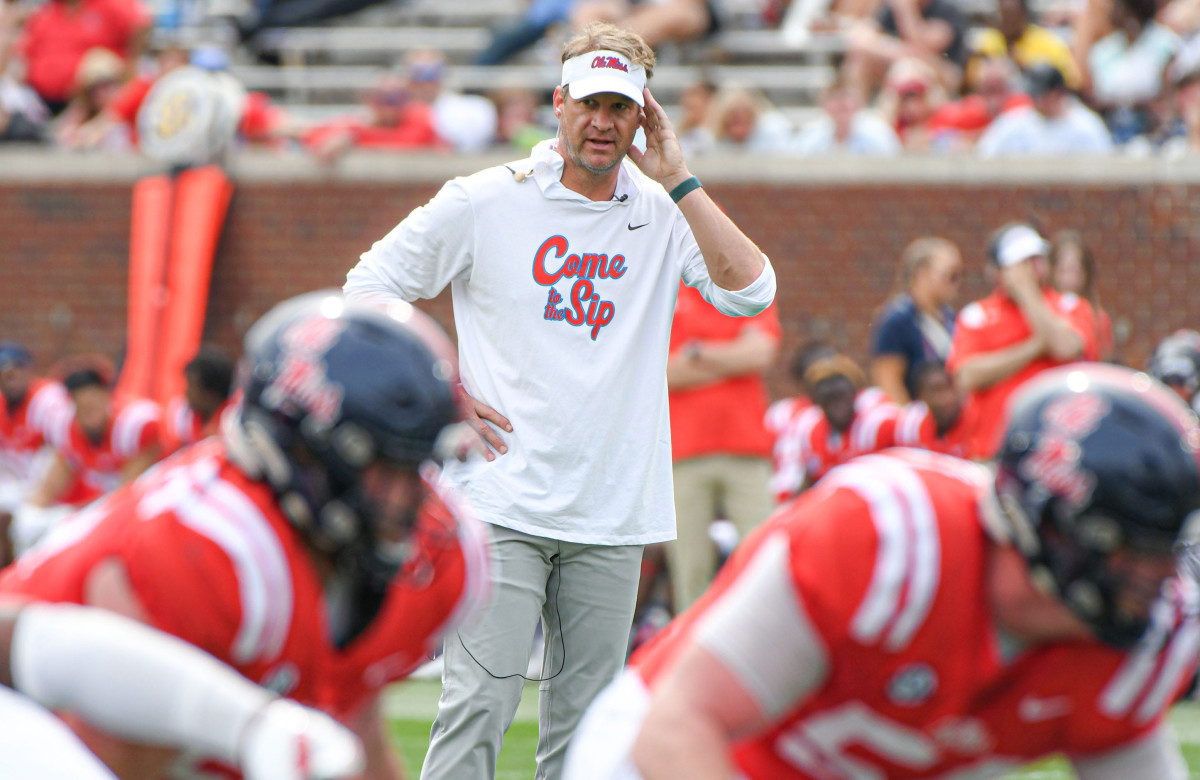
26. Second-year head coaches with Cadillac jobs
Specifically, Brent Venables at Oklahoma, Marcus Freeman at Notre Dame and Dan Lanning at Oregon. All came up through the defensive coordinator ranks. All got big-ticket jobs heading into 2022 after the schools were jilted by their offensive-minded head coaches. Two of them (Venables and Freeman) underwhelmed while replacing elite coaches. One of them (Lanning) maintained the status quo while replacing a guy who is being paid a lot at Miami. Two of them (Lanning and Freeman) lost their offensive coordinators after last season. All of them have dipped into the transfer portal at quarterback. All of them are high-powered recruiters who stand a good chance of loading their rosters and—eventually—winning big.
Just missed the list
Tom Herman, Florida Atlantic; Zach Arnett, Mississippi State; Joey McGuire, Texas Tech; Neal Brown, West Virginia; Jeff Brohm, Louisville; Mike Elko, Duke; Josh Heupel, Tennessee; Jonathan Smith, Oregon State; Andy Avalos, Boise State; Jamey Chadwell, Liberty; Kirk Ferentz, Iowa; Kyle Whittingham, Utah; Ryan Walters, Purdue; Jason Candle, Toledo; Chris Klieman, Kansas State; Lance Leipold, Kansas; Jeff Monken, Army.
Watch college football with fuboTV. Start your free trial today.
